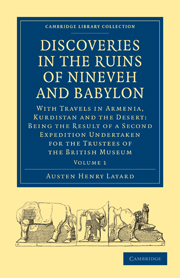 Discoveries in the Ruins of Nineveh and Babylon
Discoveries in the Ruins of Nineveh and Babylon Summary
We were again in Mosul by the 12th of October. The Jebours, my old workmen, had now brought their families to the town. I directed them to cross the river, and to pitch their tents over the excavations at Kouyunjik, as they had formerly done around the trenches at Nimroud. The Bedouins, unchecked in their forays by the Turkish authorities, had become so bold, that they ventured to the very walls of Mosul, and on the opposite bank of the Tigris had plundered the cattle belonging to the inhabitants of the village of the tomb of Jonah. On one occasion I saw an Arab horseman of the desert dart into the high road, seize a mule, and drive it off from amidst a crowd of spectators. This state of things made it necessary to have a strong party on the ruins for self-defence. The Jebours were, however, on good terms with the Bedouins, and had lately encamped amongst them. Indeed, it was suspected, that whilst Abd-rubbou and his tribe were more than usually submissive in their dealings with the local government, they were the receivers of goods carried off by their friends, their intercourse with the town enabling them to dispose of such property to the best advantage in the market-place.
About one hundred workmen, divided into twelve or fourteen parties, were employed at Kouyunjik. The Arabs, as before, removed the earth and rubbish, whilst the more difficult labor with the pick was left entirely to the Nestorian mountaineers.
- Type
- Chapter
- Information
- Discoveries in the Ruins of Nineveh and BabylonWith Travels in Armenia, Kurdistan and the Desert: Being the Result of a Second Expedition Undertaken for the Trustees of the British Museum, pp. 96 - 134Publisher: Cambridge University PressPrint publication year: 2010First published in: 1853
